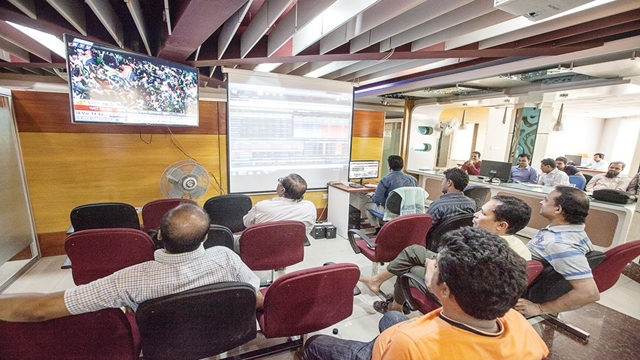FT Online
Published:2019-06-22 21:45:26 BdST
Weekly analysisStocks sink into red as budget hopes start fading
Stocks took a downward turn in the outgoing week, snapping a three-week gaining streak, as some proposed budgetary measures for the capital market have rattled the investors.
The correction was triggered by post-budget reaction as the budget stimulus might prove counterproductive, market analysts said.
The stimulus for the capital market was proposed in the national budget for the upcoming fiscal year, 2019-20, unveiled in the previous week.
In the budget, Finance Minister AHM Mustafa Kamal proposed, among others, imposition of 15 per cent additional tax on retained earnings and reserves if the amount exceeds 50 per cent of the paid-up capital of any listed company.
As part of efforts to increase money flow into the stock market, the budget also proposed imposing 15 per cent tax on stock dividend in order to promote cash dividend.
The proposal of 15 per cent extra tax on retained earnings and reserves might be a cause of concern for good companies as they retain profits for future investments, said a leading broker.
"This is quite challenging as retained earnings is simply undistributed net profit after tax, which has already been taxed," commented City Bank Capital Resources in its budget reaction.
It noted that the cash gained from retaining earnings could have also been tied up with other revenue generating assets.
According to media reports, some 209 listed companies would have to pay an additional Tk 107.92 billion tax if the proposed 15 per cent tax on 'reserves and retained earnings' is implemented.
However, in the wake of strong criticism from market stakeholders, the National Board of Revenue (NBR) chairman hinted at the possibility of reviewing the proposals.
The Bangladesh Securities and Exchange Commission (BSEC) also said that they would sit with the finance minister and the NBR chairman to discuss the issue.
The outgoing week saw five trading days as usual, with Thursday as the last session. Three of the sessions ended lower while two others edged higher.
Week on week, the DSEX, the prime index of the Dhaka Stock Exchange (DSE), settled 78.68 points or 1.44 per cent lower at 5,395.
Two other indices also closed lower. The DS30 index, comprising blue chips, plunged 10.70 points to finish at 1,894 and the DSE Shariah Index wiped out 10.78 points to close at 1,233.
The total weekly turnover stood at Tk 25.98 billion as against Tk 24.63 billion in the previous week.
The daily turnover averaged out at Tk 5.19 billion, registering an increase of 5.47 per cent over the previous week's average of Tk 4.92 billion.
Most of the major sectors witnessed corrections, with non-bank financial institution sector posted the highest loss of 3.10 per cent, followed by engineering (3.05 per cent), food (2.77 per cent), banking (2.14 per cent) and telecoms (0.56 per cent).
Only pharmaceuticals and power sectors gained 0.60 per cent and 0.08 per cent respectively.
The market capitalisation of the DSE also fell 1.05 per cent to Tk 3,978 billion on Thursday from Tk 4,021 billion in the week before.
Losers outnumbered the gainers, as out of 354 issues traded, 226 closed lower, 102 ended higher and 26 issues remained unchanged on the DSE floor.
The United Power dominated the turnover chart, with 2.58 million shares worth Tk 953 million changing hands. The company accounted for 3.67 per cent of the week's total turnover.
The other turnover leaders were JMI Syringes, Eastern Insurance, Dragon Sweater and New Line Clothings.
Sunlife Insurance was the week's best performer, posting a gain of 19.26 per cent while SEML FBSL Growth Fund was the biggest loser, shedding 15.25 per cent.
The port city bourse, Chittagong Stock Exchange (CSE), also ended lower, with its CSE All Share Price Index - CASPI - losing 242 points to settle at 16,522 points and the Selective Categories Index - CSCX - shedding 146 points to finish at 10,011.
Unauthorized use or reproduction of The Finance Today content for commercial purposes is strictly prohibited.


